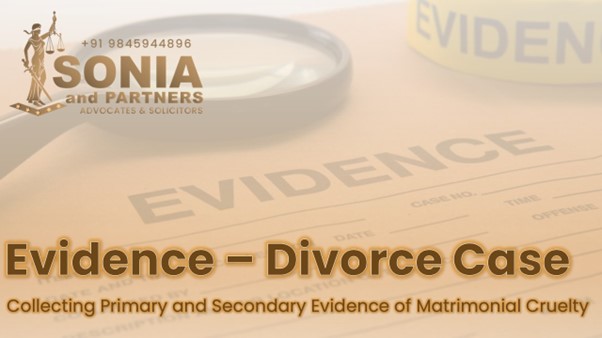Home Blog
Blog Divorce Evidence – Primary and Secondary Evidence of Matrimonial Cruelty
Divorce Evidence – Primary and Secondary Evidence of Matrimonial Cruelty

Divorce Evidence – Primary and Secondary Evidence of Matrimonial Cruelty
Matrimonial cruelty is a grave concern in India and also a ground for divorce, understanding the nuances of evidence required to prove cruelty in the court is essential for any spouse seeking justice. This blog, written from the perspective of an experienced divorce lawyer in Bangalore, aims to provide a detailed study on how a victim spouse can effectively collect and present evidence of matrimonial cruelty in an Indian court.
Understanding Matrimonial Cruelty
Matrimonial cruelty refers to any behaviour by one spouse that causes mental or physical harm to the other. However, proving cruelty in court requires substantial evidence. This evidence is broadly categorized into primary and secondary evidence.
Primary Evidence of Matrimonial Cruelty
Primary evidence refers to original, direct evidence that directly proves a fact without the need for inference or assumption. In the context of matrimonial cruelty, primary evidence may include:
1. Medical Reports and Records:
a. Medical documentation showing physical injuries inflicted by the abusive spouse.
b. Psychological evaluations indicating mental trauma or stress caused by the spouse’s behaviour.
2. Police Reports and FIRs:
a. First Information Reports (FIRs) lodged with the police detailing incidents of cruelty.
b. Statements given to law enforcement that outline specific instances of abuse.
3. Witness Testimonies:
a. Testimonies from friends, family members, or neighbours who have witnessed acts of cruelty.
b. Statements from domestic workers or colleagues who can corroborate the victim’s claims.
4. Digital Evidence:
a. Text messages, emails, or social media exchanges that contain threats, abusive language, or evidence of controlling behaviour.
b. Audio or video recordings capturing instances of verbal or physical abuse.
5. Photographic Evidence:
a. Photographs showing physical injuries or damage to property resulting from the abusive behaviour.
b. Images capturing the conditions of the living environment that reflect neglect or harm.
Secondary Evidence of Matrimonial Cruelty
Secondary evidence is indirect evidence that supports the existence of primary evidence or provides additional context. While not as strong as primary evidence, secondary evidence is crucial in building a comprehensive case. Examples include:
1. Documentary Evidence:
a. Copies of letters or written communication between the spouses that indicate ongoing disputes or abusive behaviour.
b. Financial records showing the victim’s financial dependency or any economic abuse inflicted by the spouse.
2. Character Witnesses:
a. Testimonies from individuals who can speak to the general character and behaviour of the abusive spouse.
b. Statements from therapists, counsellors, or religious leaders who have been consulted by the victim.
3. Previous Legal Proceedings:
a. Records of any prior legal actions, such as domestic violence cases or restraining orders filed against the spouse.
b. Divorce proceedings from previous marriages (if any) that may highlight a pattern of abusive behaviour.
4. Behavioural Patterns:
a. Documentation of the abusive spouse’s behaviour over time, including any history of substance abuse, infidelity, or erratic behaviour.
b. Evidence of the victim’s attempts to reconcile or seek counselling, which were rejected by the abusive spouse.
Steps for Collecting and Presenting Evidence in Court
Collecting evidence for a matrimonial cruelty case requires a strategic and methodical approach. Below are the steps a victim spouse should follow to ensure the evidence is credible and acceptable in court:
1. Document Everything:
a. Keep a detailed record of every instance of cruelty, noting dates, times, and specific actions.
b. Maintain a diary or journal that captures your emotional and psychological state over time.
2. Secure Medical and Psychological Evaluations:
a. Seek immediate medical attention for any physical injuries and ensure that the doctor’s reports are detailed.
b. Consult a psychologist or counsellor for mental health evaluations, ensuring that their findings are documented.
3. File Complaints and FIRs:
a. Report incidents of cruelty to the police and insist on a written FIR.
b. Maintain copies of all legal documents and correspondence with law enforcement.
4. Gather Digital and Photographic Evidence:
a. Collect and store digital evidence such as text messages, emails, and recordings securely.
b. Take clear photographs of any physical injuries or damage caused by the spouse.
5. Prepare Witnesses:
a. Identify key witnesses who can provide reliable testimonies and ensure they are willing to testify in court.
b. Provide your lawyer with a list of potential witnesses and their contact information.
6. Consult a Lawyer Early:
a. Engage with a divorce lawyer as early as possible to guide you through the process of collecting evidence.
b. Your lawyer can also help in securing any necessary legal protections, such as restraining orders.
Summary:
Proving matrimonial cruelty in an Indian court requires careful and strategic collection of both primary and secondary evidence. By understanding the types of evidence required and following a systematic approach to collecting and presenting it, a victim spouse can build a strong case for justice. It is crucial to act promptly and consult with a legal expert to navigate the complexities of matrimonial law effectively.
This blog post aims to empower victims of matrimonial cruelty with the knowledge and tools needed to seek justice and secure a better future. If you are facing matrimonial cruelty, remember that the law is on your side, and with the right evidence, you can make your voice heard in court.
As one of Bangalore divorce lawyers, my foremost advice is to approach this issue with a clear understanding of its legal implications. For personalized legal advice tailored to your unique situation, feel free to consult us. You may wish to reach us at +91 9845944896 or write to us at mail@lawyersonia.com We are committed to guiding you through every step of the divorce process, ensuring that your rights are protected and your future is secure.
 11:00 – 19:00
11:00 – 19:00